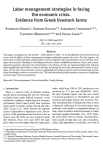Ragkos A., Koutsou S., Theodoridis A., Manousidis T., Lagka V. (2018). Labor management strategies in facing the economic crisis. Evidence from Greek livestock farms. New Medit, 01/03/2018, vol. 17, n. 1, p. 59-72.
https://doi.org/10.30682/nm1801f
https://doi.org/10.30682/nm1801f
| Titre : | Labor management strategies in facing the economic crisis. Evidence from Greek livestock farms (2018) |
| Auteurs : | A. Ragkos ; S. Koutsou ; A. Theodoridis ; T. Manousidis ; V. Lagka |
| Type de document : | Article |
| Dans : | New Medit (vol. 17, n. 1, 01/03/2018) |
| Article en page(s) : | p. 59-72 |
| Langues : | Anglais |
| Langues du résumé : | Anglais |
| Catégories : |
Thésaurus IAMM ELEVAGE EXTENSIF ; ELEVAGE INTENSIF ; EXPLOITATION AGRICOLE FAMILIALE ; GESTION DE L'EXPLOITATION AGRICOLE ; MAIN D'OEUVRE FAMILIALE ; MAIN D'OEUVRE FEMININE ; MAIN D'OEUVRE SALARIEE ; DIVERSIFICATION ; GRECE ; CRISE ECONOMIQUE ; TRAVAIL AGRICOLECatégories principales 13 - QUESTION SOCIALES ; 13.1 - Travail |
| Résumé : | This paper investigates the role of labor – either family or hired – in the development of the Greek livestock sector and the effects of labor management strategies undertaken against the crisis. For this purpose, the main types of cattle and sheep and goat farms were investigated with a questionnaire survey and their strategies were assessed. Building on the findings from four studies of different production sectors and systems, important questions about the role of hired labor in the Greece of crisis are raised and dealt with. Intensive farms profited from hired labor in order to develop, but during the crisis they demonstrated a variety of strategies. On the other hand, extensive systems safeguarded their family character and took advantage of traditional knowledge in order to survive the crisis. The labor from female family members was proven a significant asset for many of the surveyed farms. |
| Cote : | En ligne |
| URL / DOI : | https://doi.org/10.30682/nm1801f |







